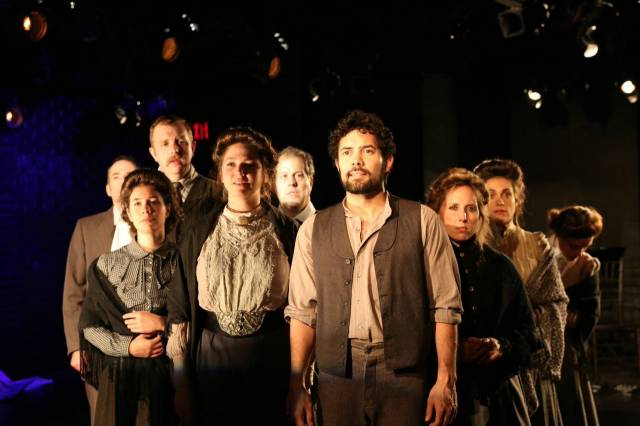

Solitary Light ends as it begins, drenching the audience in complete darkness. What transpires in between is a tender and heart wrenching musing on love and life in a time long past.
The new musical is part of the second annual Theater:Village Festival, which chose as this year's theme E Pluribus, a celebration of the experience and untold stories of the immigrants that have made New York City the dynamic place that it is. With the goal of attracting audiences to the powerhouse off-Broadway scene in the West Village, three of the four venues chose modern stories to explore the diversity of the city. But Randy Sharp, creative director of Axis Theatre Company, as well as writer and director of Solitary Light (read by interview with her here), was intrigued by a story from a time long past. Solitary Light begins as a group of Italian immigrants come to America in the early 1900s, and culminates in The Triangle Shirtwaist Factory Fire of 1911, a tragedy that claimed the lives of 146 factory workers, mostly young women, in the blink of an eye.
Sharp and Carbonara, along with their immensely talented team of collaborators, have created a fully fleshed out musical, but it's over in a flash, a fleeting snapshot of time (a metaphor which the musical explores in the song "Camera"). In merely an hour, the play hangs itself loosely around a love triangle between a sweet and sassy young American girl, the daughter of a man of considerable wealth who gets what she wants; a dreamy immigrant, camera in hand, finding his attentions divided by all of the beautiful women of New York; and a lovely factory girl, who catches the boy's eye on the streets of New York as she passes out literature for the workers union.
With a lot to cover in a short period of time, the musical exists in a sort of surreal, dreamlike fugue, and the human drama exists in rather impressionistic sketches. The young lovers aren't referred to by name, and we don't have too much time to explore the building of their relationships or their tragic plight. And yet, the hour is imbued with such pervasive melancholy that we don't miss out in the lack of details. Rather, it becomes understood that these young individuals are universal stand-ins for life's beauties and its tragedies.
Thanks to the breathtaking lighting design by David Zeffren paired with the sound design of Steve Fontaine, the small, cavelike space of Axis Theatre transforms as a quick change artist into a variety of spaces: the rolling ship, bringing hopeful immigrants to the New World; the streets of downtown New York City, a hive of activity; and the factory, a place where young women are subjected to leering bosses as they go through their repetitive tasks. The stage always feels crowded, despite there only being nine cast members, and near constant noise and movement can be almost overwhelming at times, a feeling that must reflect the overcrowding of the city in its early days.

For those not wowed by Broadway spectacle, music director Paul Carbonara, who also plays guitar as part of the four person live-score, has a gentle touch, and the music reads more like folk music than show-tune. The vocals play in a similar vein, with lead factory girl, played by Shira Averbuch, more Ingrid Michaelson than Idina Menzel. She captivated the audience with her jazzy vocals and mandolin playing, a young girl dreaming of a different life.
Just like watching Titanic, the audience is painfully aware that we are careening head first towards disaster. But unlike James Cameron, Sharp, Carbonara, and their team don't indulge us in a explosive, lavish event. Rather the moment happens lightly and almost imperceptibly, were it not for a sign proclaiming "The Fire", and the faint sounds of women screaming. In that moment, too, the play becomes heartbreakingly self aware, as the factory girls sing, "at the end of this song, they're gone."
The idea of a "political, historical musical" may leave many rolling their eyes. But Sharp focuses on some universal, intangible essence that, despite costumes of days past, makes us feel like we're experiencing emotions and human stories that are as salient today as they were one hundred years ago.
Solitary Light continues its run at the Axis Theatre through October 4. For more info and tickets, click here.
Through October 4 at the Axis Theatre.